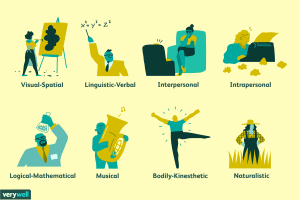Multiple Intelligences: Education Reimagined
Multiple Intelligences: Education Reimagined
By Emily Lian, M.Ed

At Ivy Kids, we are unique in our approach to early childhood education. Dr. Howard Gardner, a psychologist from Harvard University, developed the theory of multiple intelligences to reflect what we all know to be true: that we are all gifted in different ways. While the intense focus on cognitive abilities and academic skills will remain a priority as early learning centers strive to prepare children for the world of standardized testing in k-12, research has always shown the importance of active learning as its own methodology for our youngest learners (Brown, 2016; Brown et al., 2015). Thus, our experiential program strives to ensure that students have varied opportunities to feel successful in all subject areas throughout the day.
So, what is multiple intelligences?
Dr. Howard Gardner published his first book Frames of Mind: The Theory of Multiple Intelligences in 1983, which outlines his theory. He conducted his research by working with patients with traumatic brain injuries and discovered that those who struggled with certain types of tasks still displayed strengths in other areas. Since then, he has published a number of other books, including The Unschooled Mind, Multiple Intelligences: The Theory in Practice, Intelligence Reframed: Multiple Intelligences for the 21st Century, and Multiple Intelligences: New Horizons.
Dr. Gardner outlines 8 multiple intelligences in his work: kinesthetic, interpersonal, intrapersonal, logical-mathematical, visual-spatial, naturalistic, linguistic, and musical. He posits that we can be a “laser” intellect with pronounced strengths in one or two intelligences, or a “spotlight” intellect with multiple strengths. Below is a brief overview of each of the 8 multiple intelligences and how they are utilized in our classrooms. Each intelligence is colored to correspond with how they are displayed in our curriculum.
Kinesthetic
Children who are kinesthetically gifted enjoy learning through doing, utilizing body movements, and exerting physical control. Kinesthetic activities at Ivy Kids may include bowling games while teaching sight words, using fly swatters while identifying Spanish vocabulary words, and physically hopping over number spots to learn skip counting.
Interpersonal
Children who are interpersonal enjoy interacting with others. A majority of our large group activities will be interpersonal by nature, as we utilize the Socratic method in engaging with students by asking open-ended questions and encouraging open dialogue.
Intrapersonal
Our intrapersonal students may need to have time and space to decompress and engage in individual activities. Our individual sensory bins are a great opportunity for students to be able to participate in activities they can work on without having to share materials with others.
Logical-Mathematical
Children who display the logical-mathematical intelligence enjoy being engaged through critical thinking. They respond well to our curricular activities like puzzles, STEM challenges, and learning about patterns.
Visual-Spatial
Students who have an inclination towards this intelligence enjoy seeing how things come together. Visual resources are utilized throughout our curriculum, and daily art activities will allow students to express their creativity. They are also afforded with opportunities to physically build words using letters, so they can see how the letter sounds come together.
Naturalistic
Children who display naturalistic intelligences oftentimes enjoy being outdoors and display an expressed interest towards natural forces (e.g., weather), animals, cooking, etc. We incorporate naturalistic materials in sensory activities, and also provide students with activities such as building sight words out of twigs and matching numbers with beans and seashells.
Linguistic
Linguistic children often display strengths in reading and writing. We offer a print-rich environment in our classrooms with our “write the room” labels, and incorporate Books of the Week to align with our curricular themes.
Musical
Our musically inclined students always have a song in their head and can learn anything if they sing it! We utilize songs and musical instruments in our curricular activities, and teachers are always encouraged to add rhythm and/or a tune to their lessons.
It would be unfair for us to teach to just one kind of student, because we serve a unique population whose needs, interests, and strengths are all so different from one another. We strive to provide our students with a curriculum that covers all of the 8 multiple intelligences every single day, and invite our teachers to incorporate them for students who show an inclination towards certain types of activities.
The application of this theory to the field of education is recent; there have been a multitude of studies conducted overseas but it is still a relatively new approach in the United States. The empirical research surrounding the application of multiple intelligences in the classroom has been overwhelmingly positive on a global scale.
A study that examined 30 schools in Australia (Vialle, 1997) attested that, “the most common approach to incorporating multiple intelligences is through integrated units. These offer a broad range of classroom activities while promoting the connecting across disciplines that make learning more meaningful.” El Hassan and Maluf (1999) found changes in teacher perceptions of students’ abilities when they applied the theory of multiple intelligences to their kindergarten program in Lebanon. Broadening the curriculum to include a wider variety of interested, coupled with ongoing assessments, seemed to enhance student learning on a significant scale. Similarly, a study of the application of this theory to preschools in Turkey showed that daily plans enriched with multiple intelligences made a positive impact on children’s interests and active participation (Gürkan, 2019). The Project Spectrum approach in South Korea showed that “identification and development of children’s strengths is one of the most effective and desirable ways to get children to have positive working styles” (Jung & Kim, 2005).
Ivy Kids is excited to be a part of this innovative movement that caters to the strengths of all of our students. We strive to create an environment where our youngest learners are set up for success and gain confidence while becoming prepared for kindergarten and beyond. The IvyPrep curriculum recognizes that all types of intelligences are valuable in their own right, and hope to cultivate them all at our centers.
For more information about Multiple Intelligences, we invite you to check out the following articles:
https://www.institute4learning.com/resources/articles/multiple-intelligences/
https://www.edutopia.org/multiple-intelligences-research
References
Brown, C.P. (2016). Kindergarteners get little time to play. Why does it matter? https://theconversation.com/kindergartners-get-little-time-to-play-why-does-it-matter-57093.
Brown, C.P., Mowry, B., & Feger, B. (2015). Helping others understand academic rigor in teachers’ developmentally appropriate practices. Young Children, 70(4), 62-69. https://www.naeyc.org/resources/pubs/yc/sep2015/helping-others-understand-academic-rigor.
El Hassan, K., & Maluf, G. (1999). An Application of Multiple Intelligences in a Lebanese Kindergarten. Early Childhood Education Journal, 27(1), 13–20.
Gardner, H. (1983). Frames of mind: the theory of multiple intelligences. New York: Basic Books.
Gürkan, T., Dinçer, Ç., & Çabuk, B. (2019). Integrating Multiple Intelligences into Daily Plans: A Preschool Example. Turkish Online Journal of Qualitative Inquiry, 10(3), 321–345.
Jung, T., & Kim, M.-H. (2005). The Application of Multiple Intelligences Theory in South Korea: The Project Spectrum Approach for Young Children. School Psychology International, 26(5), 581–594.
Vialle, W. (1997). In Australia: Multiple Intelligences in Multiple Settings. Educational Leadership, 55(1), 65–69.
Image Source: https://www.verywellmind.com/gardners-theory-of-multiple-intelligences-2795161






